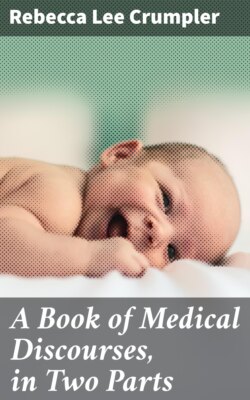Читать книгу A Book of Medical Discourses, in Two Parts - Rebecca Lee Crumpler - Страница 5
ОглавлениеCHAPTER II.
THE PRESENT MODES OF WASHING AND DRESSING THE NEW-BORN.
Usually, as soon as the birth of a child is announced, a basin or tub of hot water is ordered. The washing begins with a “wee bit of rag” and a great cake of perfumed soap purchased long, long before, for the occasion. Then follows wiping with a great linen towel, during which time the creature gets well aired, being indirectly exhibited to as many as have courage to look on and admire “the cunning little thing.”
“The water must be hot, to get off the grease,” said an old nurse. Aye, but with ignorant help would it be surprising if a little of the skin came off first? In more favored circles a nice bath tub is prepared, the water of an equal temperature with the room. Some fine soap is put in to make a suds, which is applied after the surface of the body is oiled. Some cold water adherents persist in using ice-cold water upon a new-born babe, depending on “rubbing it to get up a circulation.” I once knew a divine (divines have rules sometimes) whose customs led him to have his only child washed in this way, and believing in the adage of “the hair of the dog curing the bite,” he continued to doctor it himself for eighteen months; from its birth to its death, with cold water. The babe received a severe cold, stopping up its nostrils and air-tubes, and rendering its little life wholly miserable. To the cause of all this suffering they gave the technical name, Catarrh.
The methods of washing infants just described are more common even in this enlightened age of humanity than is generally known. The excuse for cold baths may exist in the mode of life of the erratic tribes, or among uncivilized nations whose minds are dark upon the construction and office of a nervous system. The several sad results that I myself have witnessed at times, and places, that it was not deemed my business to speak, have led me to adopt what seemed a more humane course. With the use of cold water some judgment is required, as many infants, when born, are weak, and ready to yield up life upon the application of the slightest sedative. The skin being so largely supplied with nerves which transmit all sensations to the internal organs, as telegraph wires do the electric current. Thus cold water may send a chill to some vital part, the result of which no effort in the power of man can counteract. It is next to impossible to keep a babe as warm as it should be going through with the customary routine. Indeed it is not at all uncommon for a babe to be laid beside its mother (if not alone in a crib) lips purple and cold as a lump of clay. I once looked upon a babe who from this cause had for three days resisted all attempts to get it warm. Thus, I fear, many come and go. Does any desire to preserve the vitality of a new being? Then it will not suffice to be too self-assured or too oriental to seek to improve in the matter.
I deeply regret to have to state that I have heard many apparently intelligent persons express opposition to the continuation of the human species. But let me ask, What devastating visitations may we not expect if we seek to diminish God’s images by any selfish or misguided motives?
THE USE OF SOAP.
There are many kinds of soap in use for the purpose of washing clothes, cleansing paint, etc. Then there are not a few advertised as superior for washing the skin. But the fact that water into which soap is rubbed turns white, or becomes sudsy, is sufficient evidence that it contains an alkali, or something having the nature of potash. To use it on the tender skin of infants is but to experiment for the benefit of the dealer, at the expense of the babe. Again, soap is irritating to the more tender surfaces, as the lips and eyelids. If the suds is sucked by the child while the sponge is passed over the face, severe purging may occur. Then if soap gets in the eyes, it is liable to cause sore or inflamed eyes, perhaps for life. I truly believe that more children are afflicted with sore eyes, ears, noses, and heads, whose friends took the precaution to have them washed with “pure baby soap,” than could be counted in a hundred years. The germs of bronchitis, which means cold settled in the air-tubes leading to the lungs,—pneumonia, which means lung fever, indigestion, each or all, can be inducted into the system in the first washing. The male physician, unlike the woman physician, does not always remain long enough to see this important duty properly performed. This may be owing to the fact that, among the poorer classes, two or three women are present who are expected to be experts in baby-washing. But, as a fact, many old women sit around on such occasions who have almost as little knowledge what and how to do, as the babe whose expected advent has called them together. Therefore we cannot too strongly protest against the practice of many physicians,—that of leaving a woman in the hands of an inexperienced person as soon as the navel cord is severed. For it is not at all reasonable to conclude, that because a woman is the mother of many children, she is an expert in the matter of washing and dressing the new-born, or of relieving the various ailments incident upon child-bearing.
